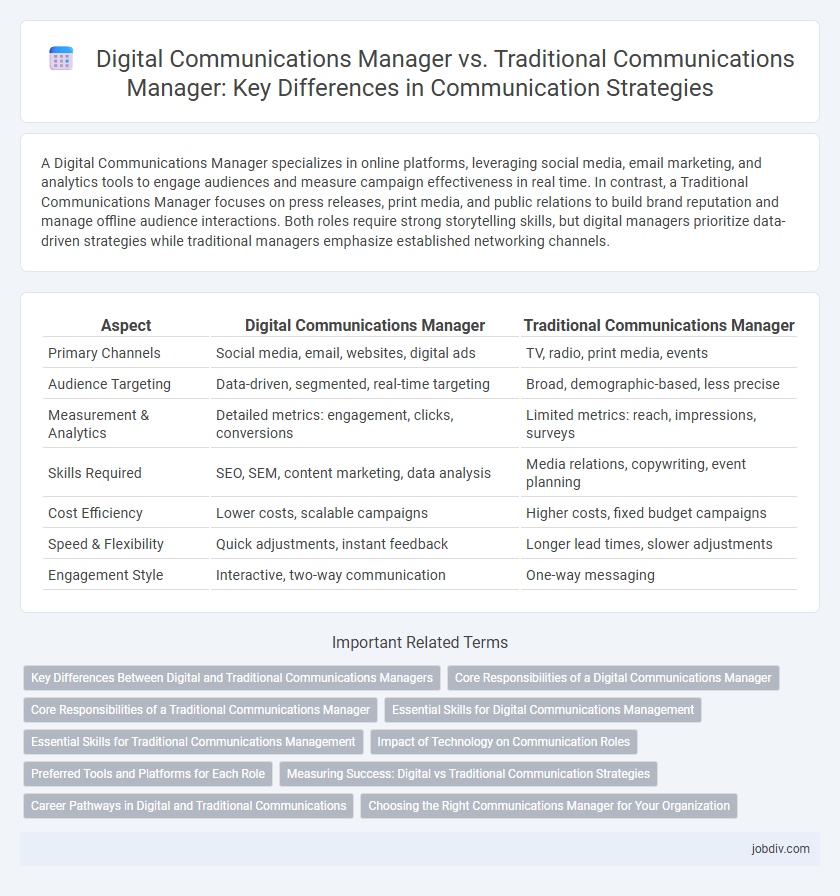A Digital Communications Manager specializes in online platforms, leveraging social media, email marketing, and analytics tools to engage audiences and measure campaign effectiveness in real time. In contrast, a Traditional Communications Manager focuses on press releases, print media, and public relations to build brand reputation and manage offline audience interactions. Both roles require strong storytelling skills, but digital managers prioritize data-driven strategies while traditional managers emphasize established networking channels.
Table of Comparison
| Aspect | Digital Communications Manager | Traditional Communications Manager |
|---|---|---|
| Primary Channels | Social media, email, websites, digital ads | TV, radio, print media, events |
| Audience Targeting | Data-driven, segmented, real-time targeting | Broad, demographic-based, less precise |
| Measurement & Analytics | Detailed metrics: engagement, clicks, conversions | Limited metrics: reach, impressions, surveys |
| Skills Required | SEO, SEM, content marketing, data analysis | Media relations, copywriting, event planning |
| Cost Efficiency | Lower costs, scalable campaigns | Higher costs, fixed budget campaigns |
| Speed & Flexibility | Quick adjustments, instant feedback | Longer lead times, slower adjustments |
| Engagement Style | Interactive, two-way communication | One-way messaging |
Key Differences Between Digital and Traditional Communications Managers
Digital Communications Managers specialize in online platforms, leveraging social media, email marketing, SEO, and analytics tools to engage target audiences and measure campaign effectiveness. Traditional Communications Managers focus on offline channels such as print media, public relations, event coordination, and direct mail to build brand awareness and maintain public relations. The key differences lie in the skill sets required and the mediums used, with digital roles emphasizing data-driven strategies and real-time interaction, while traditional roles prioritize face-to-face communication and long-established media relationships.
Core Responsibilities of a Digital Communications Manager
A Digital Communications Manager focuses on managing online content, social media strategies, and digital marketing campaigns to engage audiences effectively across multiple platforms. They analyze data metrics and user interactions to optimize communication tactics in real time, enhancing brand visibility and customer engagement. Their core responsibilities include overseeing website content, email marketing, SEO, and digital advertising to drive measurable growth and audience retention.
Core Responsibilities of a Traditional Communications Manager
A Traditional Communications Manager primarily focuses on managing press releases, coordinating media relations, and overseeing internal communication channels to maintain a consistent organizational message. They are responsible for crafting and distributing printed materials, organizing events, and managing crisis communication through established offline methods. Their role emphasizes building relationships with journalists, monitoring traditional media coverage, and ensuring alignment with corporate branding in non-digital platforms.
Essential Skills for Digital Communications Management
Digital Communications Managers must excel in data analytics, social media strategy, and SEO optimization to effectively engage online audiences. Proficiency in content management systems, digital advertising, and real-time interaction tracking distinguishes their skill set. In contrast, Traditional Communications Managers prioritize media relations, press release writing, and event coordination within established offline channels.
Essential Skills for Traditional Communications Management
Essential skills for a Traditional Communications Manager include expertise in media relations, press release writing, and event coordination, ensuring effective engagement with established channels like print and broadcast media. Strong interpersonal communication and crisis management abilities are crucial to maintaining organizational reputation and managing stakeholder relationships. Proficiency in public speaking and message crafting for targeted audiences supports consistent brand messaging across offline platforms.
Impact of Technology on Communication Roles
Digital Communications Managers leverage advanced technologies such as social media platforms, data analytics, and AI to create targeted, real-time engagement strategies that significantly enhance audience reach and interaction. Traditional Communications Managers rely on established channels like print media, television, and direct mail, which often result in slower message dissemination and limited audience analytics. The impact of technology has shifted communication roles towards a data-driven, multi-channel approach requiring digital fluency and continuous adaptation to emerging digital trends.
Preferred Tools and Platforms for Each Role
Digital Communications Managers prioritize tools like social media platforms, content management systems, and analytics software to engage audiences and measure campaign performance. Traditional Communications Managers favor press releases, print media, and face-to-face events for direct interaction and trusted information dissemination. Both roles require mastering specific communication channels tailored to their target demographics and strategic goals.
Measuring Success: Digital vs Traditional Communication Strategies
Digital Communications Managers leverage advanced analytics tools like Google Analytics and social media insights to measure campaign effectiveness through real-time data, engagement rates, and conversion metrics. Traditional Communications Managers rely on methods such as surveys, focus groups, and media reach reports to assess audience response and message penetration. The precision and immediacy of digital measurement tools provide richer, data-driven insights compared to the broader, often delayed evaluation techniques used in traditional communication strategies.
Career Pathways in Digital and Traditional Communications
Digital Communications Managers often advance through roles in social media strategy, content creation, and data analytics, leveraging skills in SEO, digital marketing, and online engagement to drive brand visibility. Traditional Communications Managers typically follow a trajectory involving public relations, media relations, and corporate communications, emphasizing stakeholder management, press release writing, and event coordination. Both career pathways require strong leadership and communication skills but differ in the technological tools and platforms prioritized for audience reach and message dissemination.
Choosing the Right Communications Manager for Your Organization
Selecting the right communications manager depends on your organization's goals and target audience, with a Digital Communications Manager specializing in online strategies, social media engagement, and data-driven campaigns, while a Traditional Communications Manager excels in media relations, press releases, and corporate communications through established channels. Digital managers leverage SEO, PPC, content marketing, and analytics tools to maximize reach and engagement in real-time, critical for brands focusing on digital transformation. In contrast, traditional managers build strong relationships with journalists and stakeholders, ideal for organizations emphasizing reputation management and offline presence.
Digital Communications Manager vs Traditional Communications Manager Infographic

 jobdiv.com
jobdiv.com